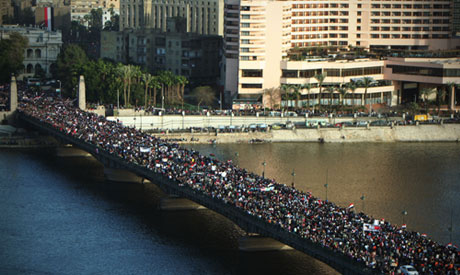 The second anniversary of Egypt's 25 January Revolution this Friday comes amid an unprecedentedly charged and polarised political atmosphere. Political parties and movements from across the spectrum – both Islamist and non-Islamist – have made plans for the day ranging from protest rallies and marches to public street-cleaning campaigns.
The second anniversary of Egypt's 25 January Revolution this Friday comes amid an unprecedentedly charged and polarised political atmosphere. Political parties and movements from across the spectrum – both Islamist and non-Islamist – have made plans for the day ranging from protest rallies and marches to public street-cleaning campaigns.
On Sunday, 16 revolutionary parties and groups announced plans to mark the occasion with countrywide demonstrations. These groups say they will continue to push for longstanding revolutionary goals – namely 'freedom, bread and social justice' – and combat perceived political monopolisation by Egypt's Muslim Brotherhood.
Friday's rallies are slated to begin immediately following noon prayers. Several marches will set out for Tahrir Square from different areas of Cairo and Giza, including Helwan, Shubra, Al-Zawaya, Imbaba and Mohandeseen's Mostafa Mahmoud Square. Another march has also been planned from points in Cairo to the Presidential Palace.
Additional rallies are also expected in several governorates, including Alexandria, the Red Sea, Kafr Al-Sheikh, Assuit, Port Said, Suez and Sharqiya.
Each rally will reportedly have its own theme. The march from Imbaba to Tahrir Square, for example, will condemn inflation and 'despotism,' while the planned march from Maadi will oppose the 'Brotherhoodisation' of the state.
Among the parties and groups participating in Friday's planned protests are the Constitution Party, the Egyptian Popular Current, the Socialist Popular Alliance, the Free Egyptians party, the Revolutionary Socialists and the Maspero Youth Coalition.
The April 6 Youth Movement (Ahmed Maher Front) has also declared its intention to take part in the planned demonstrations. "This 25 January anniversary will not be a celebratory one, but rather a new revolutionary wave to complete the revolution's goals," said movement founder Ahmed Maher.
April 6 demands the amendment of Egypt's new constitution and the implementation of electoral promises made to liberal forces by President Mohamed Morsi.
The Strong Egypt Party has also announced its intention to participate with the aim of pressing for the realisation of outstanding revolutionary demands. On Wednesday, the party announced that its leader, moderate-Islamist Abdel-Moneim Abul-Fotouh, would lead a march from Giza's Al-Istaqma Mosque.
The Muslim Brotherhood and its Freedom and Justice Party (FJP), meanwhile, declared that they would – unlike last year – refrain from taking part in either celebrations or protests. Rather, the group plans to launch a campaign from 24 January to 5 February aimed at providing free healthcare and public sanitation services.
The Brotherhood has reportedly directed its young cadres to protect its headquarters – and those of the FJP – following recent attacks on the group's offices by unknown assailants. Brotherhood vice chairman Mahmoud Ezzat has stated that the group would "not accept and will pre-empt any attempt to sow violence or chaos" on the occasion of the uprising's second anniversary.
The Salafist Nour Party, meanwhile, announced that it, too, would not participate in any anniversary activities. "The country's circumstances cannot bear any more protests or celebrations," said spokesman Gamal El-Marra. "We face many challenges that require serious work so as to rebuild the state after decades of sabotage and neglect."
Nour Party spokesman Nader Bakkar told Ahram Online: "We had a plan to hold scientific exhibitions in public squares across the country for young innovators to display their inventions, but, unfortunately, the current state of political polarisation in Egypt has made this impossible."
Tarek El-Zomor, for his part, the prominent jihadist leader of Al-Gamaa Al-Islamiya and its Reconstruction and Development Party, warned Egypt's secular opposition against attempts to use the occasion to bring down the Morsi administration.
"If the president is forced out of power through illegitimate means, then the Muslim Brotherhood – who are known for their peaceful nature – will have to step aside to make way for revolutionary Islamists who will fight the anarchists and secularists," El-Zomor said on Thursday.
The opposition National Salvation Front announced that it is not staging Friday's rallies to force Morsi to step down, but merely to protest his policies.
Meanwhile, questions remain as the role that police, especially the Central Security Forces (CSF), will play in Friday's planned demonstrations.
The interior ministry has said it would secure public property across the country, including ministries, embassies and political party offices – including those of the FJP. According to local press reports, the CSF will deploy near police stations and prisons due to fears that these might be attacked on Friday.
In an official statement issued Thursday, the interior ministry called on the public to pursue only peaceful activities. It also urged political parties and protest groups to refrain from attacking security forces and report any "suspected infiltrators" who attempt to incite violence.
Nor will Egypt's armed forces participate in any anniversary celebrations. Rather, the military has announced that it would use the occasion to honour officers and soldiers injured during the revolution and its aftermath.
According to a military spokesman, Egypt's armed forces will not play a role in securing state institutions during Friday's planned demonstrations, leaving these responsibilities instead to the interior ministry.



